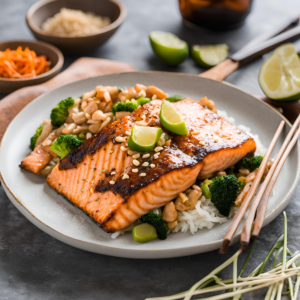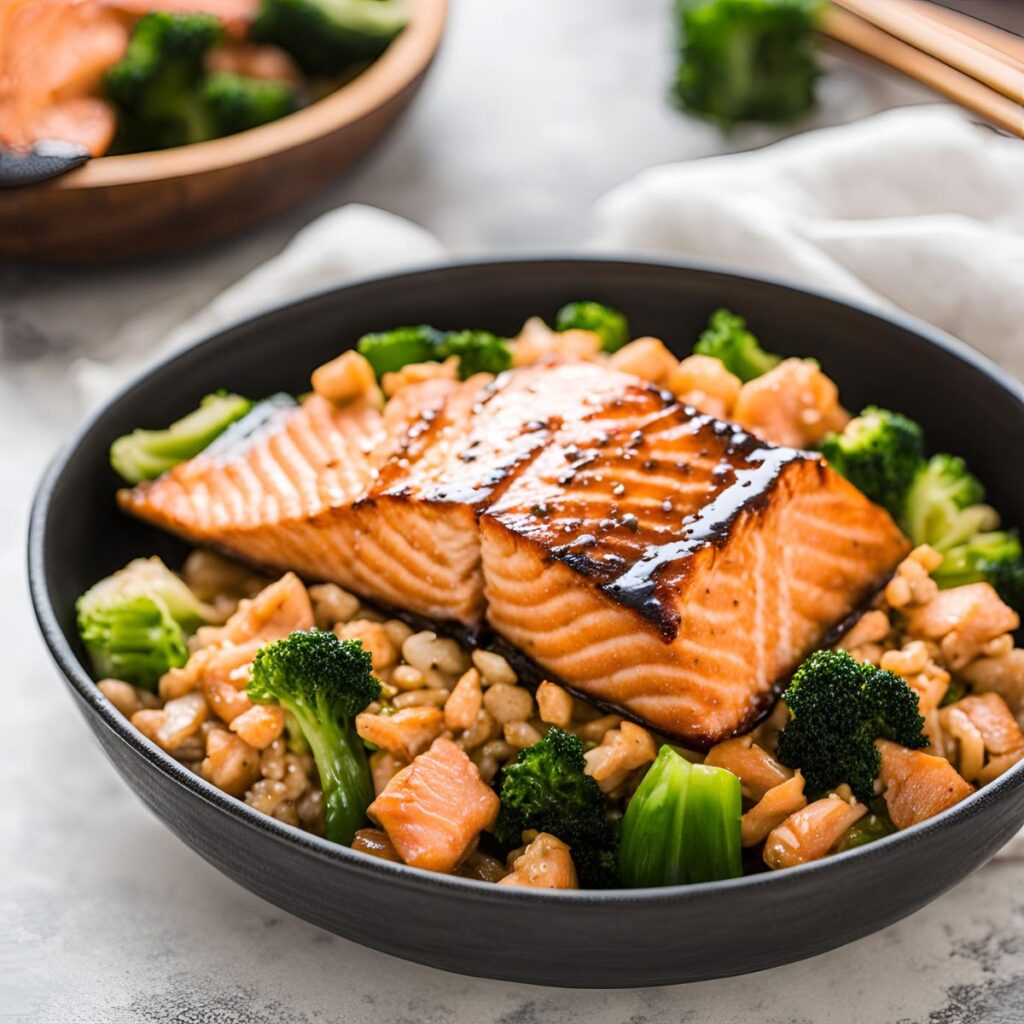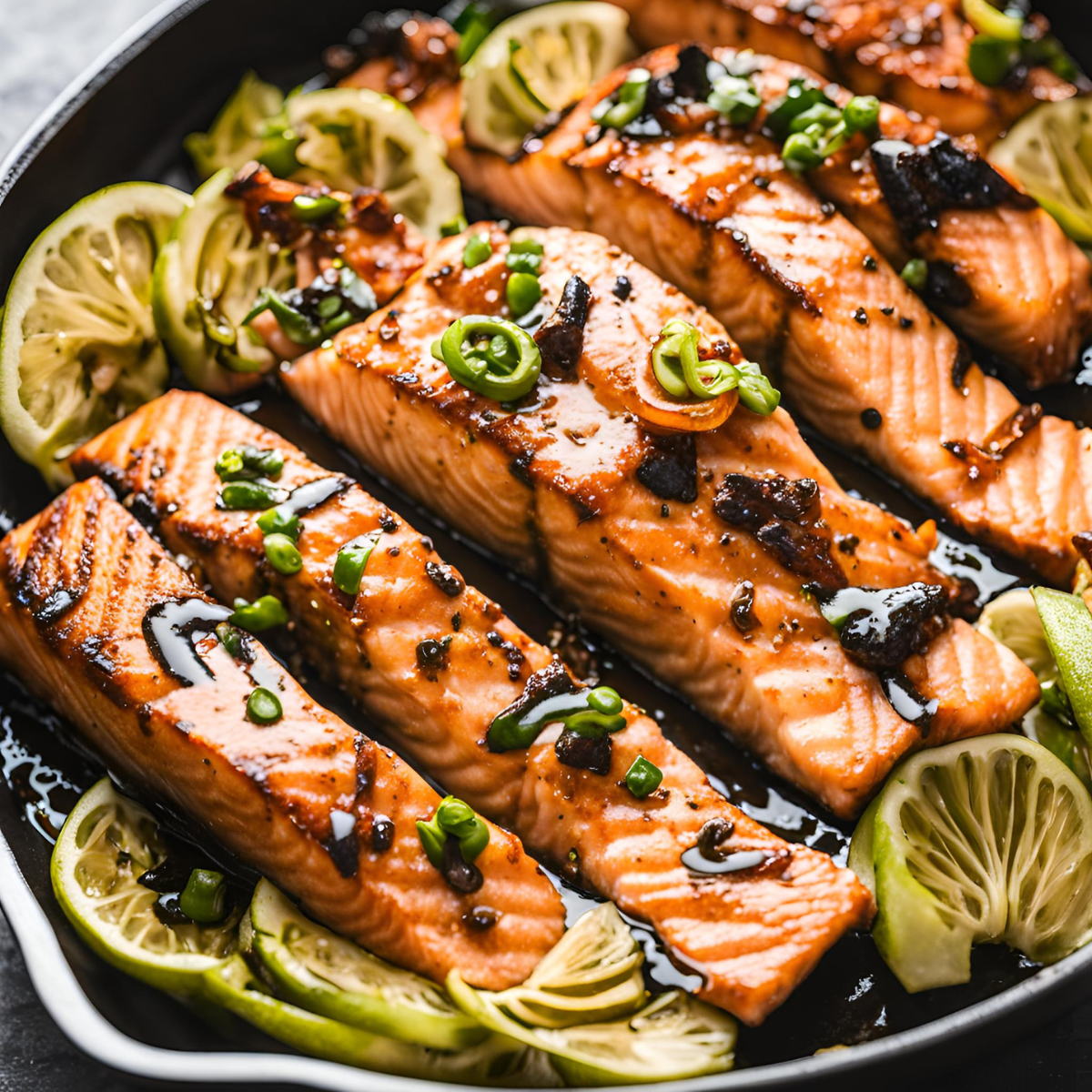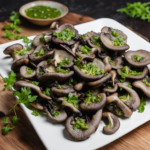Hibachi is a traditional Japanese cooking method where food is grilled over a high-heat charcoal fire. Originally, “hibachi” referred to a portable heating device with a charcoal brazier in a box or container. Nowadays, “hibachi” often means cooking on a flat iron griddle or teppanyaki grill.
If you love Japanese restaurant hibachi dinners, you’ll enjoy this Hibachi Salmon Recipe. It brings the Japanese steakhouse experience to your home kitchen! Whether you have a hibachi grill, a cast iron griddle, or just a big skillet on the stove, you can recreate the flavours of this traditional Japanese cooking style any night of the week with my easy hibachi-style recipes.
Serve Hibachi Salmon over white rice, brown rice, and steamed veggies for a quick meal. For a lower-carb option, use cauliflower rice. Or go all out with a hibachi spread including Hibachi Fried Rice, Grilled Hibachi Vegetables, and Yum Yum Sauce (Japanese White Sauce).
Store leftover salmon in an airtight container in the fridge for up to 2-3 days. To reheat, cook gently over medium-low heat on the stove in the hibachi sauce, or add a few tablespoons of stock or water if needed.

Hibachi Salmon Recipe
Ingredients
- 2-3 Salmon fillets 5-6 oz each, skin on or off
- 1 tbsp Toasted sesame oil
- 1 tbsp Extra virgin olive oil
- 1 tbsp minced Garlic
- 1 tbsp minced Ginger
- 2 tbsp Dark soy sauce use tamari for gluten-free
- 2 tbsp Cooking wine or rice vinegar or white wine vinegar
- 2 tbsp Freshly squeezed lemon juice or 1 tablespoon lime juice
- ¼ tsp Freshly ground black pepper
Instructions
Prepare the Salmon:
- Rinse the salmon fillets and pat them dry using paper towels.
Sear the Salmon:
- Heat a non-stick pan over medium-high heat.
- Add sesame oil and extra virgin olive oil to the pan.
- Once the oil is hot and shimmering, place the salmon fillets in a single layer and sear for 4 minutes.
- Flip gently using tongs and cook the second side for another 3-4 minutes. Avoid overcooking; the salmon should still have a touch of pink inside as it will continue to cook after being removed from the heat.
- Transfer the fillets to a plate and set aside.
Prepare the Sauce:
- Reduce the heat to medium.
- Add ginger and garlic to the same pan and sauté for 15-20 seconds.
- Add soy sauce, cooking wine, lemon juice, and black pepper to the pan and cook for 10-15 seconds, stirring continuously.
Combine and Serve:
- Transfer the salmon fillets back to the pan and coat them with the sauce on both sides.
- Transfer the fillets to the serving plate and pour the remaining sauce over them.
- Serve hot and enjoy!
Notes
- Don’t Overcook the Salmon: Make sure the salmon still has a bit of pink inside when you take it off the heat, as it will continue to cook afterward.
- Use Fresh Ingredients: Fresh ginger, garlic, and lemon juice will enhance the flavors and make the dish taste even better.
Nutrition Facts:
| Nutrition | Value |
|---|---|
| Calories | 385 kcal |
| Carbohydrates | 4g |
| Protein | 35g |
| Fat | 25g |
| Cholesterol | 95mg |
| Sodium | 1082mg |
| Sugar | 2g |
Can I Use a Different Type of Fish Instead of Salmon?

Yes, you can use other types of fish like tuna, cod, or halibut. Just make sure to adjust the cooking time based on the thickness of the fillets, as different fish may cook at different rates. The key is to ensure the fish is cooked through but still moist and tender.
What Can I Serve With Hibachi Salmon?
Hibachi Salmon pairs well with Hibachi fried rice, steamed vegetables, or a simple salad. You can also serve it with a side of miso soup or a bowl of noodles for a more complete Japanese-style meal. Don’t forget to garnish with fresh herbs or sesame seeds for added flavour and presentation.





